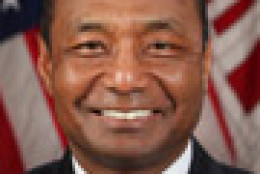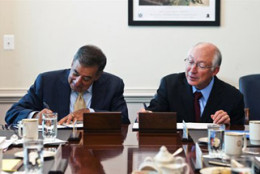Army Corps of Engineers
-
Greg Garcia, the chief information officer/G6 of the Army Corps of Engineers, said the Defense Department’s mandated transition to Windows 10 is a top of mind priority, but he is balancing that with cyber, cloud and other priorities.
May 06, 2016 -
The Defense Department's new policy on climate change forces component heads to consider climate change in almost every decision.
January 19, 2016 -
Greg Garcia is taking over as the new chief information officer at the Army Corps of Engineers. He is one of several new CIOs agencies named over the last month.
January 18, 2016 -
VA will seek at least $1.1 billion from Congress to rescue a Denver hospital project that was supposed to cost $600 million. The final price tag won't be known for several more months. VA also asked the Army Corps to conduct a complete examination of its major construction programs across the country.
January 23, 2015 -
Leaders at the Army Corps of Engineers say the effects of climate change mean its vast network of civil works projects is going to have to contend with weather events that are more severe — and most importantly — less predictable. As Federal News Radio DoD Reporter Jared Serbu reports, the Corps is changing its planning process to account for that uncertainty, and it's about much more than building higher and stronger dams and levees.
November 13, 2014 -
The Army Corps of Engineers' strategy for building more resilient civil works infrastructure involves planning for more unpredictable weather events, and treating watersheds as integrated systems instead of a collection of standalone projects.
November 13, 2014 -
Congress has approved $8 billion for 26 inland waterway improvement projects. But, many of those projects won't be completed for another 50 to 60 years. The Army Corps of Engineers is looking to speed up the process through public private partnerships.
July 14, 2014 -
Army Corps of Engineers faces billions of dollars in backlogged projects. With little hope of additional funding from Congress, officials are looking for alternative ways to finance the public infrastructure they're charged with maintaining.
June 27, 2014 -
The head of the Army Corps of Engineers says the nationwide network of civil works infrastructure his agency manages is falling apart. The Corps doesn't have enough money coming from Congress to fix the problems, so it's looking for new ways to pay for the work it needs to do. Federal News Radio's DoD Reporter Jared Serbu has the details. Read Jared's related article.
June 26, 2014 -
Over the past 12 years, the Army Corps of Engineers has had a full plate — building new facilities for the last round of base realignments, dealing with the aftermath of Hurricane Katrina, and a lot of overseas construction in Iraq and Afghanistan. But as wars and military budgets draw down, it's time for the agency to reshape itself, says Lt. Gen. Thomas Bostick, the Corps' commanding general. He spoke with Federal News Radio DoD Reporter Jared Serbu. Hear Jared's full hour-long interview with Bostick, Weds. March 26 at 3p.m. Listen here.
March 25, 2014 -
Representatives of the construction and building design industries told lawmakers Tuesday that agencies' practices in issuing design-build construction contracts are dissuading qualified contractors from even offering bids.
December 04, 2013 -
The Army Corps of Engineering is already having difficulty recruiting candidates for certain fields, and is convinced the problem will worsen unless STEM graduation rates increase.
August 14, 2013 -
A National Research Council report recommended Congress and the White House take a broader view at planning and allocating funds for the resources maintained by the Army Corps of Engineers.
October 31, 2012 -
Army says 130 companies have expressed interest in building renewable facilities on military installations so far. Winners will be picked by the end of the year.
August 08, 2012 -
Tom Simmons of Citrix discusses the technological challenges facing teleworkers. Dave Romano of the Army Corps of Engineers talk about the Asian Carp. Steve Redburn, former senior executive, Office of Management and Budget,discusses the current stalemate on Capitol Hill and Dr. Paul Ceruzzi of the Smithsonian Air and Space museum looks at the historical significance of Telstar.
July 13, 2012







